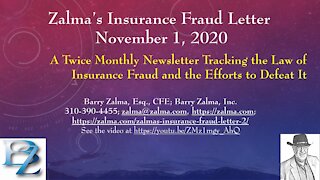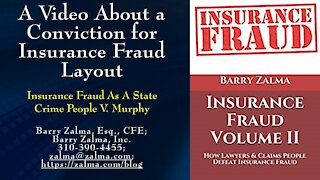Premium Only Content

ZALMA’S INSURANCE FRAUD LETTER
A VIDEO EXPLAINING
ZALMA’S INSURANCE FRAUD LETTER JANUARY 15, 2021
Professional Insurance Adjusting and Insurance Fraud
At the turn of the century, insurers, in a search for profit, decimated their professional claims staff. They laid off experienced personnel and replaced them with young, untrained and unprepared people.
A virtual clerk replaced the old professional claims handler. Process and computers replaced skill and judgment.
Insurers intentionally forgot that the promises made by an insurance policy are kept by the professional claims person. A professional claims staff is a cost-effective method to avoid litigation.
The professional claims person is an important part of the insurer’s defense to litigation against insurers for breach of contract and to detect and defeat attempts at insurance fraud.
A staff of claims professionals dedicated to excellence in claims handling are a profit center for an insurance company. Experience establishes that claims professionals resolve more claims for less money without the need for either party to involve counsel. A happy insured or claimant satisfied with the results of his or her claim will never sue the insurer.
Incompetent or inadequate claims personnel force insureds and claimants to lawyers. Every study performed on claims establish that claims with an insured or claimant represented by counsel cost more than those where counsel is not involved.
Excellence in Claims Handling
Excellence in claims handling is a program that can help insurers avoid charges of bad faith in both first and third party claims.
Proposal
Insurance fraud is not a local problem. It is a depletion of the wealth of the entire country. The lawyer for the Department of Insurance of each state is the State Attorney General. A special unit could be established in the office of the Attorney General, funded with the monies taken from the insurance industry to support the war against insurance fraud. This unit should be given a simple mandate: File and prosecute every insurance fraud brought to the unit by the Fraud Division that has a better than 50% chance of success.
Single counts should be prosecuted. When prosecutors file multiple charges against individual defendants the case becomes a major action requiring a great deal of time to prosecute. Judges and juries do not want to be involved in a prosecution that takes months to prosecute.
If there are multiple counts available, the prosecutor should charge only the one where the evidence of fraud is overwhelming. If the jury finds for the defendant the prosecutor can charge the next count continuously until the statute of limitation runs.
Sentences across the state must be consistent and true punishment. I have seen such inconsistency where cases, after conviction, the criminals received sentences that ranged from 24 hours to 24 years.
It is not enough for the state to say that the insurance companies must investigate and work to fight fraud. The state must also aggressively and vigorously fight insurance fraud.
If the legislatures really want insurers to fight insurance fraud; if the legislatures wish to keep strong and viable this important industry; if the legislatures want to reduce the insurance premiums paid by their constituents, they must make practical the war on insurance fraud. As long as the tort of bad faith and the exposure of punitive damages hangs over insurance companies, the war will be one of attrition where no one will win.
The stories I have fictionalized in my book “It’s Time to Abolish The Tort of Bad Faith were written to show how insurance fraud is taking money out of the pockets of innocent and honest people who buy insurance. For every dollar taken by a fraud an insurer must collect two dollars in premiums. Every person in the US who does not commit fraud is paying to support those who do. A minimum of $20.00 for every $100.00 every person insured pays in premiums goes into the pockets of insurance criminals. If the stories in this book make the reader angry, write to your local District Attorney, States Attorney, Attorney General or US Attorney and let them know of your anger. Consider the digest of the case that follows as an example of how difficult it is to effectively fight insurance fraud when a fraud proved with overwhelming evidence still needed to go through trial and appeal before the insurance criminal was sent to jail.
-
 13:02
13:02
Barry Zalma, Inc. on Insurance Law
1 year agoMurder Pays
4271 -
 5:16
5:16
Barry Zalma, Inc. on Insurance Law
4 years agoZalma’s Insurance Fraud Letter – January 1, 2021
110 -
 15:42
15:42
Barry Zalma, Inc. on Insurance Law
4 years agoZalma’s Insurance Fraud Letter – October 1, 2020
55 -
 15:23
15:23
Barry Zalma, Inc. on Insurance Law
4 years agoZalma's Insurance Fraud Letter - November 1, 2020
231 -
 20:18
20:18
Barry Zalma, Inc. on Insurance Law
4 years agoGuilty of Insurance Fraud
128 -
 17:47
17:47
Barry Zalma, Inc. on Insurance Law
4 years agoA Video About a Conviction for Insurance Fraud
93 -
 17:00
17:00
Barry Zalma, Inc. on Insurance Law
4 years agoA Video Explaining the Three Major Responses to Insurance Fraud
126 -
 2:12
2:12
WKBW
4 years agoBuffalo teen who claimed car was vandalized now accused of insurance fraud
24 -
 3:31
3:31
KMGH
4 years agoAAA Insurance - Insurance Coverages
97 -
 3:21
3:21
KMGH
4 years agoAAA Insurance - New Year New Insurance
5